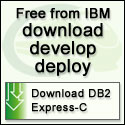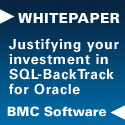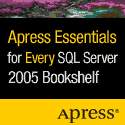Slashing a Slashdot Exchange - Part 4
Part 1 | Part 2 | Part 3 | Part 4
“I did see your plea for help with funding Chris Date. Frankly, I think his approach is "dated", from what I could understand from talking to him at VLDB’99 in Edinburgh. We now live in a world of Agents, Semantic Web and XML. That is our main research focus here. Thus we would not be interested.”
— Senior faculty, Scottish University
“But within the context of the University of Washington, it would not be my classes where it would be appropriate to present that type of information [on fundamentals]. My classes are graduate level, highly technical, and I don’t allow PowerPoint slides or any non-technical content.”
— Oracle practitioner teaching at the graduate level
“Recently, James H. Billington, the current Librarian of Congress, remarked that instead of a knowledge-based democracy, we may end up with an information-inundated democracy. I share his concern, so allow me to end with this simple wish. May, in spite of all distractions generated by technology, all of you succeed in turning information into knowledge, knowledge into understanding, and understanding into wisdom.”
— Edsger Dijkstra, Convocation Speech
In my last three columns I debunked the most egregious comments in a Slashdot.com exchange, reflecting ignorance of data management fundamentals and inability to reason by practitioners in the industry. I have reserved criticism of the most appalling level of discourse in the exchange for this column. Most appalling, because it is by an academic, that is, somebody whose very task is to educate practitioners, such that they don’t display that level of ignorance. If the teachers don’t know and appreciate foundation knowledge, how can we expect it from their students?
This is not the first time I raise the sad issue of academia renouncing its education function and turning itself into what Dijkstra calls a “mayfly chaser” of industry’s marketing fads, and a product certification platform for vendors (e.g. “Denormalization for Performance: Et Tu Academia?”, “The Chasing of Mayflies: Reply to Riggs”, “The Myth of Market-based Education”, “More on the Myth of Market-based Education”). On the consequences for industry practice — and society in general — see “Lenin, Trotsky, and Freedom from the Tyranny of Knowledge and Reason.”
Here is yet another blatant example of the consequences of obsession with industry fads, and a degrading academia, as demonstrated at Slashdot by one LurkerXXX.
LurkerXXX: “I didn’t say no one should point it out. Pointing it out is fine and good. Beating a dead horse is just annoying and useless. I’m an academic myself (not of sorts, a real academic), not a coder. I’ll point out problems in discussions in papers I write, but I don’t rant on and on endlessly about things like this.
Point out the problem. Then suggest feasible ways to move forward if you have one. Ranting on and on in a forum like this (which is going to consist of almost entirely end-users) that someone is incorrectly using the nuances of the word ‘relational’ (without properly explaining it in the first place in his rants!) is not just useless, but annoying. Just @%#*ing over and over doesn’t progress science. He likes to hear himself talk. That’s about it.”
I will remind the reader, in passing, that in Part 1 of this four-part series, a journalist that interviewed me referred to Slashdot as a forum for “serious discussion of architectural issues”. Is that something that end-users do? Be that as it may, what this “real academic” dismisses as “ranting” is our consistent demonstration of costly flaws in industry technologies, products, and practices that he (and his colleagues) are in large part responsible for.
He complains that we do not “properly explain” what relational means, ignoring the dozens of books, articles and Web sites where we do nothing but this very thing, which he and his colleagues not only fail to do themselves, but also refuse to include in their curricula. We shall shortly see the absurd justification for it, but consider: the relational model is the application of logic and mathematics to database management and, therefore, the first — and as far as we know, the only — sound placement of the field on a sound scientific basis. And yet this self-professed “real academic” finds that our efforts to prevent ignoring, dismissing, and corruption of that scientific foundation — which should be his reason for being, not ours, lowly consultants that we are — “do not progress science.” If not, then what, pray, does? Apparently “suggesting feasible ways to move forward,” that is, chasing mayflies, riding industry fads, which are utterly devoid of science. Otherwise put: progress science by ignoring it. It’s his argument that’s useless, not ours.
LurkerXXX: “Sorry, but The Third Manifesto is almost a decade old. Nothing material has come of it. Academicians all over the world are working on the problem of finding a working relational system, and companies like Oracle and MS are throwing lots of money at it. Finding a working truly relational replacement for SQL is non trivial. A lot of very bright minds have taken on the task. One day I’m sure someone will come up with one. In the meantime, folks who are in the field already understand that SQL isn’t really relational. Beating the dead horse isn’t making anyone’s work progress any faster.”
Another fine reasoning example. Not only do some of today’s academics fail to produce or teach science to guide practitioners in their work — allowing the industry to drive it — but when somebody does produce such science and the industry fails to take advantage of it — because practitioners are not properly educated to know and appreciate it — they blame the science for being “too old” and of no value. Let us get this straight: a major foundation of science, logic and mathematics, which has withstood the test of time and practice for thousands of years, is too old to be useful? Any wonder that the students of those who utter such drivel become practitioners and do not bother to rely on scientific principles in their practice, and dismiss them out of hand?
It is patently false that (a) “academicians all over the world are working on the problem of finding a working relational system” (b) “Oracle and Microsoft are throwing lots of money at it” (c) “folks in the field understand that SQL is not really relational.” On what planet does he live?
As we demonstrated in our writings, it’s been impossible to get any university or academic interested in relational technology, be it for research or teaching purposes; after all, it’s old, obsolete, and useless; we got to “move on”. I dare LurkerXXX and his ilk to produce evidence of any recent work of theirs that is meaningful and relational in character. Indeed, efforts, such as The Third Manifesto, and the TransRelational™ Model come from outside the academia, and are either ignored or dismissed by the likes of LurkerXXX, who are too busy chasing XML and object mayflies, wasting efforts on trying to somehow fit some science to industry fads post-hoc.
Even when the industry intended to implement the relational model, it failed. They came up with SQL precisely because they did not know and understand not just the “nuances” of relational, but none of it. And how could they, with teachers like LurkerXXX, who consider the application of logic old, obsolete and useless? (see “On DBMS Builders, MySQL and Innobase: Are They DBMSs, Let Alone Relational?”, Comments on an Interview with Jim Gray). Without proper education, vendors are certainly not going to achieve much when they throw money at everything but relational technology, and instead of science guiding them, they are driving science out of academia.
LurkerXXX: “Which is just one more stupid rant on his part. Yes, SQL is not really relational.
Before @%#*ing and moaning about that fact over, and over, and over and over ad nauseum, please suggest a working system which *IS* a true relational system that we can use instead.
He can’t. There isn’t one that works. If there was, we would all transition to it in short order.
But there’s not. He should stop the constant pissing and moaning about it, and going on and on how he is superior because he understands what ‘true’ relational stuff is, until he can damn well propose a WORKING alternative.”
More fine reasoning from somebody whose main asset should be his intellect. I will leave it to the reader to judge who is the moaning and pissing stupid here. But I dare LurkerXXX to find more than a handful of older practitioners who know what relational means, and that SQL is not relational.
How does LurkerXXX propose to get a working relational system, if he and his colleagues do no research and no teaching on the subject? Not only that, but when others make that effort, they dismiss it as old and useless because it’s not implemented. Boggles the mind.
We would like nothing better than not to have to “rant,” and we wouldn’t have to if academia did its proper job. It is not a matter of us being “superior,” but rather the academia becoming increasingly inferior.
For the benefit of the reader, Dataphor by Alphora is a working implementation of the data language principles laid out in The Third Manifesto; Required Technologies is working on a true RDBMS based on the TransRelational™ implementation model; and we recently outlined a relational solution to the treatment of missing data in Practical Database Foundations paper #8, “The Final NULL in the Coffin”. What are LurkerXXX contributions, may we, again, ask?
Let me once again quote Dijkstra, a truly real academic, concerned with the intellectual degradation of academia:
“…I am annoyed by two phenomena [in computer science] that both strike me as symptoms of immaturity.
The one is the widespread sensitivity to fads and fashions, and the wholesale adoption of buzzwords and even buzznotes. Write a paper promising salvation, make it a ‘structured’ something or a ‘virtual’ something, or ‘abstract,’ ‘distributed’ or ‘higher-order’ or ‘applicative’ and you can almost be certain of having started a new cult
The other one is the sensitivity to the market place, the unchallenged assumption that industrial products, just because they are there, become by their mere existence a topic worthy of scientific attention, no matter how grave the mistakes they embody. In the sixties the battle that was needed to prevent computing science from degenerating to ‘how to live with the 360 has been won, and ‘courses’ -- usually ‘in depth’!-- about MVS or what have you are now confined to the not so respectable subculture of the commercial training circuit. But now we hear that the advent of the microprocessors is going to revolutionize computing science! I don’t believe that, unless the chasing of dayflies is confused with doing research. A similar battle may be needed.”
— E. Dijkstra, Proc.4th Int. Conf. on Software Engineering, 1979
It takes much more than what LurkerXXX displays to be a real academic. And increasingly there are fewer and fewer of those who possess what it takes. No wonder that they criticize us for essentially doing their job.
--
Fabian Pascal has a national and international reputation as an independent technology analyst, consultant, author and lecturer specializing in data management. He was affiliated with Codd & Date and for 20 years held various analytical and management positions in the private and public sectors, has taught and lectured at the business and academic levels, and advised vendor and user organizations on data management technology, strategy and implementation. Clients include IBM, Census Bureau, CIA, Apple, Borland, Cognos, UCS, and IRS. He is founder, editor and publisher of Database Debunkings, a Web site dedicated to dispelling persistent fallacies, flaws, myths and misconceptions prevalent in the IT industry. Together with Chris Date he has recently launched the Database Foundations Series of papers. Author of three books, he has published extensively in most trade publications, including DM Review, Database Programming and Design, DBMS, Byte, Infoworld and Computerworld. He is author of the contrarian columns Against the Grain, Setting Matters Straight, and for The Journal of Conceptual Modeling. His third book, Practical Issues in Database Management serves as text for his seminars.
Special Offer: Author Fabian Pascal is offering DBAzine.com readers subscriptions to the Database Foundations Series of papers at a discount.
To receive your discount, just let him know you’re a DBAzine reader
before you subscribe! Contact information is available on the “About” page of his site.
Contributors : Fabian Pascal
Last modified 2006-01-04 01:40 PM




